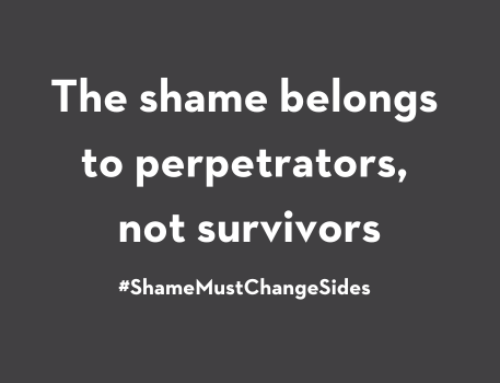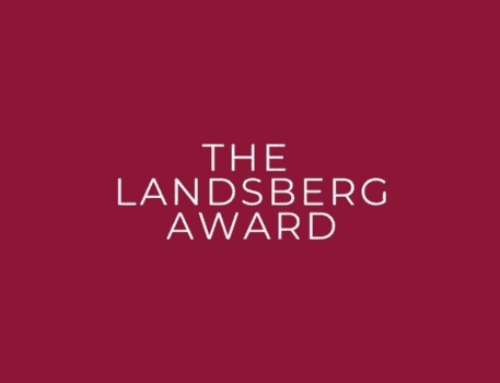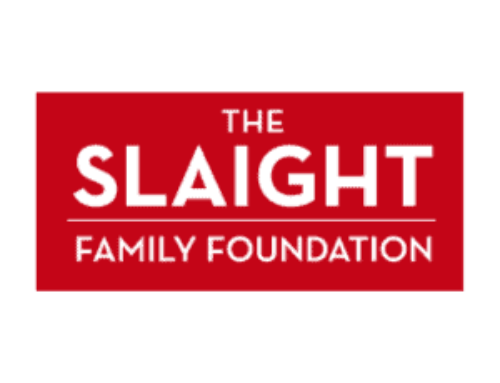
“Comedy is all about taking something that is otherwise painful, and spinning it in a way that allows you to laugh it off,” says Maysoon, who will be speaking at the Canadian Women’s Foundation Breakfasts in Calgary on Oct. 22 and Toronto on Oct. 27.
As a Palestinian Muslim woman living with cerebral palsy, Maysoon has scaled her share of obstacles while working toward her dream role: a part on General Hospital. Realizing that she didn’t fit the conventional actress mold, Maysoon looked to role models like Ellen DeGeneres and Gilda Radner. Comedy would be her ticket into the entertainment world.
As a comic, she advocates for equality and draws attention to the absence of people living with disabilities in mainstream media. She has presented at TED, appeared on various talk shows, co-founded the New York Arab-American Comedy Festival and founded a charity called Maysoon’s Kids.
We talked to Maysoon about her sense of humour, how she deals with challenges like discrimination and cyberbullying, and what she’d like to do next in her career.
What is the role comedy plays in bringing about equality and social change?
I think comedy is a really interesting genre. When I started doing comedy 15 years ago, it was definitely a man’s game.
I think that we’re constantly battling the misconception that women are not funny. It’s something that has been said so often.
Even though you have the rise of people like Tina Fey and Amy Schumer and Amy Poehler, it’s still an uneven playing field. You’re still not hearing a woman’s name when you ask people who’s their favourite comic.
As far as me using comedy as a woman, I think that it’s a great equalizer because I, as a comedian, tend to be very neutral. I wouldn’t call my comedy female; I talk about politics, I talk about pop culture, I talk about family … and I think that I can hold my own on stage with any man and I can make the audience laugh just as much.
In my own personal work, I think it’s been empowering for women to see someone who is not a conventional beauty, who is not using blue-collar comedy that focuses on my sex life or my vagina or something like that. I feel like I’ve used comedy in a way to be empowered. I think it can be very empowering for women.
How does comedy play a role in your advocacy for people living with disabilities?
In America, I’ve really battled hard against the fact that Hollywood tends to ignore people with disabilities. As a person with a disability, it’s so much harder than our able-bodied counterparts to get cast on television.
If you turn on the TV from 9 a.m. to 3 p.m., there is not a single human being with a visible disability that appears on mainstream American television–not in daytime dramas, talk shows, or as anchors in the news. We’re not visible in entertainment, and that’s really something that I’ve battled to change.
While I say I don’t want to be a comic who is known as “the disabled comic,” I am aware of the fact that when I get to do things like Countdown with Keith Olbermann, or Cityline with Tracy Moore, or the Queen Latifah show, that I am changing the perception of what people with disabilities can and can’t do.
One of the things I joke about is trying to bring sexy back to disability, because people with disabilities are often thought of as eternal happy children, who don’t grow up to be adults, and we are adults, so I try to kind of shake up that image of us not being full-fledged humans.
Who or what makes you laugh?
I love Jon Stewart, who just wrapped up the Daily Show, and I love comedians who use comedy to change the world. I think that’s something that he did.
I’m a huge Carol Burnett fan. I grew up watching Carol Burnett, and she wasn’t a conventional beauty; she was really powerful sketch artist who pushed the envelope, and she’s a huge influence. She makes me laugh.
I think Tina Fey and Amy Poehler are the two most brilliant, brilliant voices in comedy that are working today.
Dave Chappelle makes me super proud. As a Muslim, we always march out Dave Chappelle as our icon because people are like, “Do Muslims laugh? Do Muslims do comedy?” and I’m like Dave Chapelle is a Muslim, and that’s all I ever have to say.
You’ve talked about the fact that you saw comedy as an opening into the world of acting. What would you be doing if you weren’t a comedian?
Nothing! I was a teacher, I taught 7th– and 8th-grade reading and English before I became a comedian, but I honestly am not good at anything but comedy.
I’m a prolific writer. That is part of being a comedian. I think a lot of people think comedy is just stage and talk. But we write a lot. I’ve written for Newsweek, the Huffington Post, the BBC, and CNN. I’ve written screenplays, chapters of books, blogs. I’m a prolific writer, but I don’t think I could ever have made a living doing that.
Do you think progress is being made when it comes to more positive and diverse representation of people living with disabilities?
No, I don’t. I’ve spent two decades working on this issue and I see more and more resistance.
People do not like the idea of having people with disabilities being equal to them in America. I’m constantly facing the same type of ableism, and prejudice, and bigotry, the idea that a person with a disability can’t possibly do the same job as well as the able-bodied counterpart.
Also, we battle the fact that disability is considered unattractive. When I started doing Countdown with Keith Olbermann as a full-time contributor, I constantly got nasty comments on YouTube because people are not used to seeing disability.
I’ve been called an honour killing gone wrong, they say I had bad botox, that I’m distracting, that I’m totally unwatchable. And I believe that that’s because there’s such a lack of positive images of disability that able-bodied audience members view us in fear and disgust, instead of as equal partners in society.
Do you think of yourself as a role model for people with disabilities?
I definitely don’t think of myself as a role model, but I know that I am. I receive email from all over the world—from people living with disabilities, from people who are parenting young children with disabilities, and I know that I’ve influenced a lot of others and changed the way they approached their relationship with their bodies, because they’ve seen the tactics I’ve used have been really successful.
I have people asking me about everything from nutrition to yoga to positive body image, and how a positive attitude can help create a space where you’re more comfortable with your circumstances. I think one of the ways that I’ve been able to empower girls who have disabilities is to create the image that having a disability does not define you. Even if you have a disability, it shouldn’t be what people focus on, and it’s not the most important thing about who you are.
At the same time, when people say things like, “The only disability is a bad attitude,” that’s not true. We have to acknowledge that no matter how positive your attitude is, when you have a medical condition, you might need accessibility. You might need medication, you might need physical therapy. Just having a positive attitude does not heal people.
You’ve talked about having lived with multiple challenges – you’ve made the joke about winning a gold medal in the “Oppression Olympics.” What’s been the biggest challenge for you?
The biggest challenge for me is being Palestinian. I’ve been shocked by the negative response that I’ve received throughout the entertainment industry because of the fact that I’m Palestinian.
When you talk about Palestinian equality, people assume you’re anti-Semitic, that you encourage violence, and I receive a kind of hate that I would never receive when I talk about women’s equality or advocating for people with disabilities.
One of my mantras is equality for all. That means whether you’re disabled, female, whatever faith you are, whatever colour you are, whatever age you are, whatever ability you have, whatever nationality you are, that we all deserve equality.
You’ve talked about having to deal with cyberbullying, including negative comments about your appearance. What would be your advice to girls who are navigating this issue?
When you’re being bullied, there are a couple of things to keep in mind: Nothing beats a bully better than ignoring them. Nothing. You empower people by allowing the words they choose to use against you to define you. Only you get to define you.
So when I was online and I was reading people saying I looked like an honour killing gone wrong, I didn’t allow that to define me. I didn’t allow it to make me feel like I’m ugly, I don’t deserve to be on TV. Quite the opposite.
It made me understand how it important it was not let these people win. I read the comments and I say it’s unbelievable to me that people are like this. When I speak to students at schools or in colleges, I tell them, don’t be an Internet troll. Don’t be the person who causes another person to harm themselves.
In addition to empowering those who are bullied, I try to teach those that do the bullying that there are better ways to spend your life than going online and tearing down other people. Post some pictures of silly cats! We don’t need to spend time being hateful.
For women in entertainment, would you agree that age becomes an obstacle at a certain point?
God, please don’t add age to my list! It’s not an obstacle in my genre – you have comedians like Carol Burnett, who at the night of her career was my age.
Comedy and commentary, those are the two things I do. Both of those careers have a real longevity. You have people like Barbara Walters and people like Diane Sawyer, who have been in the game for 30, 40 years and are still able to do the work. Oprah, who has been in the game for 30 years and is more powerful than ever.
Thank God I’m not trying to be a film ingénue. But I never thought of my age, so, seriously, I want to thank you for adding that to my oppression Olympics!
As a comedian, do you have any tips for people for how to maintain a sense of humour in tough situations?
One of the rules of comedy is that comedy is pain plus time. So if you’re walking down the street and you fall down, that moment that you fall down, and you’re bleeding and your skirt is hiked up above your head and people are honking, and laughing, that is not funny.
But when you go home and tell your story to your friends, it’s hysterical, right? That’s the basis of it.
I’m going to use Jon Stewart as an example again. Jon Stewart was at his best and his funniest when he talked about things that totally angered him, that viscerally disgusted him. Those were the topics that he would hit out of the ballpark.
Comedy is all about taking something that is otherwise painful, and spinning it in a way that allows you to laugh it off.
You’ve talked about how one of your early dreams was to be on General Hospital. Based on where you are now, do you have a new dream role?
My dream is still to be on General Hospital. I can’t let that go! I’m determined to be on that soap opera before I die. If I’m ever in a life-or-death situation, I’m going to beg whoever is about to kill me to give me one last chance to be on General Hospital.
I do have two other dreams. I love being a host and I love being a commentator. I would love to be a on a panel show, like The View, or The Talk or The Real. I think it would advance the disability movement 50 years if we had a permanent presence of positive, empowered disability on talk TV.
My third goal is to win on Oscar. I just need to be cast in a movie or have my movie made, and I would definitely win because disabilities win awards. Look at the Oscars for the past 20 years, and the Golden Globes… the last 20 years, the majority of men who have won Oscars have played a person with a disability.
I would really like the opportunity to do what Marlee Matlin did and be a female lead with a disability playing a disabled character. I think it’s shocking that it’s been 30 years since we’ve had a physically disabled female character as an Oscar contender.
I also dreamt of tap-dancing on Broadway and I did that, so that was one dream I accomplished. I haven’t met Oprah Winfrey yet, but I dreamt of meeting Dave Matthews and I met Dave Matthews.
I’ve had a really good track record with my dreams, so I have a lot of hope!
Learn More
Take Action
- Don’t miss Maysoon Zayid's inspiring keynote speech at our Toronto and Calgary Breakfasts!
- Sign up for our e-newsletter to have our latest stories and resources sent to your inbox.
- Follow us on Facebook and Twitter to join a national conversation on gender equality.
- Make a donation to help us invest in the strength of women and the dreams of girls.







